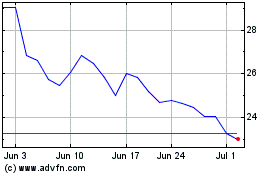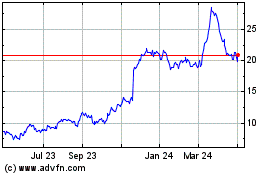By Jon Emont
DHAKA, Bangladesh -- Five years after a factory collapse killed
1,100 workers in Bangladesh's worst industrial disaster,
organizations representing Western brands say that authorities in
the country aren't ready to go it alone to ensure safety standards
are up to scratch.
Shortly after the Rana Plaza tragedy, North American and
European retailers established two parallel organizations to
inspect Bangladeshi factories and mandate safety repairs. Both
groups initially planned to phase out in 2018.
Instead, the Bangladesh Accord on Fire and Safety, backed by
European brands such as Hennes & Mauritz AB and Zara owner
Inditex SA has announced plans to extend its efforts for up to
three more years.
The Alliance for Bangladesh Worker Safety, which includes North
American companies such as Walmart Inc. and Gap Inc., will wind
down its operations this year. It plans to establish a smaller
safety monitoring organization to ensure the factories the
Alliance's brands source from that are already up to code continue
to maintain rigorous inspections.
"The national safety regulatory body that's supposed to be doing
the work that we've been doing over the last five years is nowhere
near prepared," said Rob Wayss, executive director of the
Accord.
Bangladesh's government tried to upgrade its monitoring and
inspection regime for factories after the disaster, but progress
has been plodding, according to data compiled by the International
Labor Organization from Bangladesh government sources.
Of 754 garment factories that are part of the Bangladeshi
government's safety program, just 109 have resolved more than half
of the safety issues identified, which include structural, fire,
and electrical safety -- a significantly slower rate than factories
covered by the Accord and Alliance. The Accord covers around 1,600
factories and the Alliance 666, although there is significant
overlap.
Md. Shamsuzzaman Bhuiyan, Inspector General for the Department
of Inspection for Factories and Establishments, said his unit has
the resources to take over the inspections for factories currently
being monitored by the Accord and Alliance. He said he didn't agree
with the Accord's views on the matter. "We believe that DIFE is
capable of conducting the inspections. A good number of engineers
have been recruited," he said.
Bangladeshi authorities have "got their hands pretty full," said
Jennifer Bair, associate professor of sociology at the University
of Virginia, who has researched the Bangladesh apparel industry.
"It's going to be a really tall order to both complete the
remediation of the existing factories and also assume
responsibilities that are currently under the jurisdiction of the
Accord and Alliance."
Since the garment industry took off in Bangladesh in the 1980s,
it has been plagued by industrial disasters, including the Tazreen
fire of 2012, which killed more than 100 people after managers
prevented workers from leaving their stations after a fire alarm
sounded.
Industry analysts say garment factories have become less
dangerous since 2013, though the Bangladeshi government doesn't
compile comprehensive statistics on factory injuries and deaths.
Still deadly incidents continue, including a boiler explosion at a
garment factory last year that killed 10 workers and injured dozens
more.
Under the Alliance and Accord, factories that don't invest in
safety improvements are blacklisted from selling to major western
retailers, a move designed to protect the roughly 3 million
Bangladeshis making garments for the brands.
Western retailers have continued these efforts also because
their biggest investors want to ensure that factory improvements
made after the Rana Plaza collapse are maintained to lower the
reputational risk of doing business in Bangladesh.
"You have to make sure that everything you have worked so hard
for doesn't fall flat the moment you leave," said Anna-Sterre
Nette, Senior Advisor Responsible Investment and Governance to MN,
a major Dutch pension fund manager that invests in the apparel
sector.
The Accord and Alliance report that over 80% of factory safety
issues identified in safety inspections, such as inadequate fire
escapes and dangerous electric wiring, have been fixed.
Such efforts have "helped to establish a culture of safety,"
said David Hayer, Senior Vice President of Global Sustainability at
Gap, a member of the Alliance.
Walmart, a founding member of the Alliance said its goal was to
transition to a "locally-run safety monitoring organization" that
will maintain factory safety programs pioneered by the
organization, such as a worker helpline.
The Accord has said it extended its efforts partly because it
needed more time to complete its mandate. While it has successfully
removed lockable and collapsible gates from nearly all factories
that had them, preventing factory owners from locking their workers
in during the workday, more expensive and complex operations are
taking longer. For example, only 39% of Accord factories that had
inadequate fire systems during initial inspections have since
installed fire detection and prevention systems that are fully up
to code.
Bangladesh still needs help when it comes to monitoring safety,
said Sayeeful Islam, the managing Director of Concorde Garments, a
company that sells to a range of western retailers including
Walmart. If the Accord and Alliance were to leave Bangladesh, "I
would be worried for my country."
Write to Jon Emont at jonathan.emont@wsj.com
(END) Dow Jones Newswires
March 29, 2018 08:14 ET (12:14 GMT)
Copyright (c) 2018 Dow Jones & Company, Inc.
Gap (NYSE:GPS)
Historical Stock Chart
From Apr 2024 to May 2024

Gap (NYSE:GPS)
Historical Stock Chart
From May 2023 to May 2024
